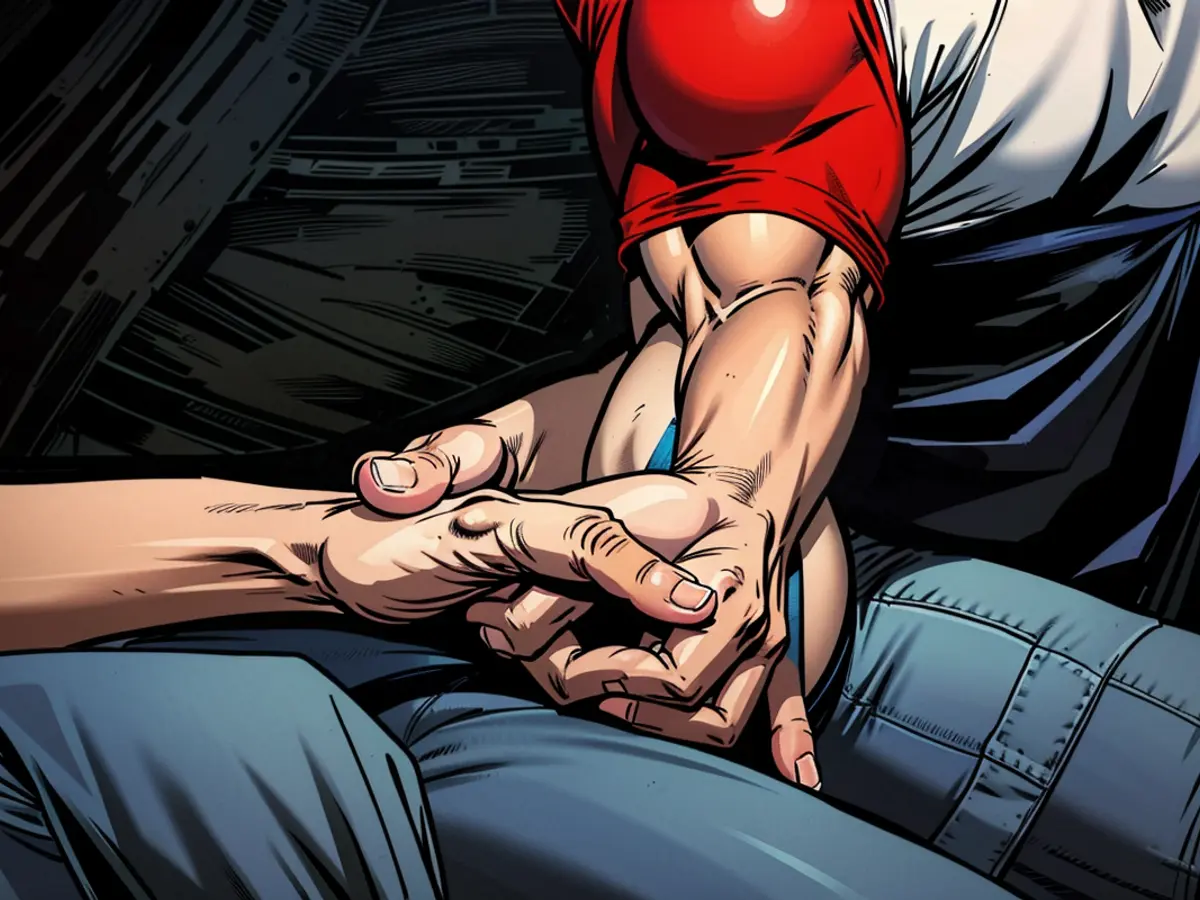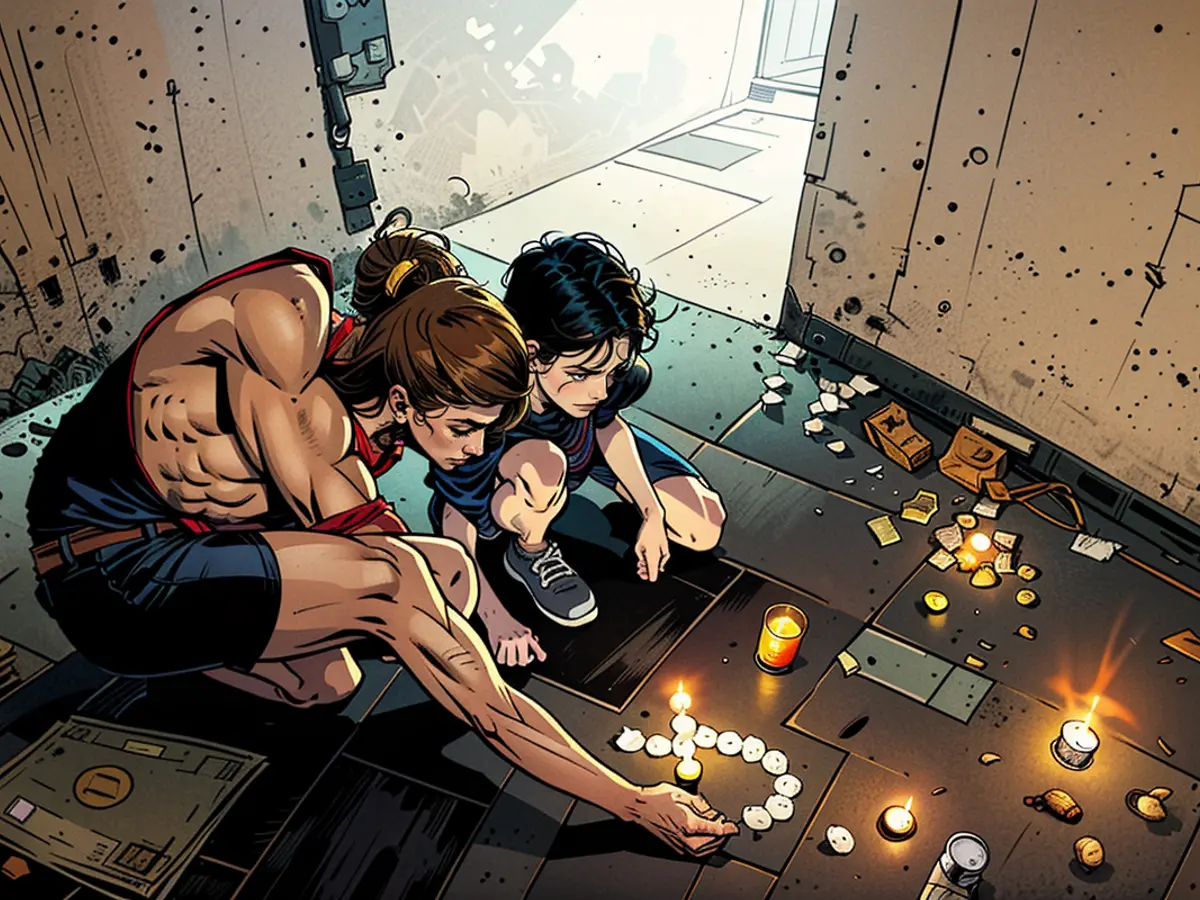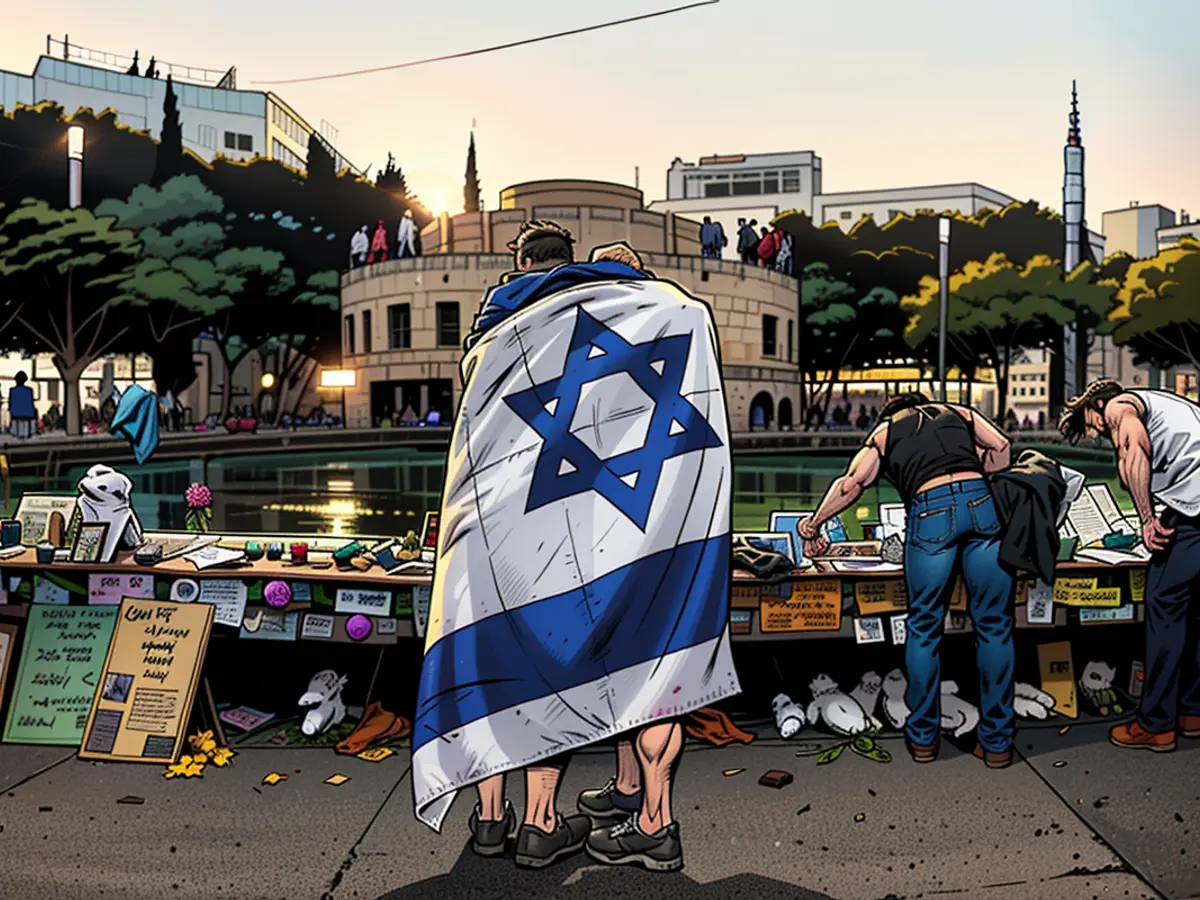Israel commemorates the October 7 terror assault anniversaries, brimming with grief and fury.
At the exact location where terrorists invaded during the Nova Music Festival celebration in southern Israel a year ago, commemorating the tragic October 7 incidents that led to the demise of 1,200 individuals and captivity of over 250, stands a memorial.
The horrific terror attack left the crowd devastated as Hamas militants stormed the festival, cut off escape routes, and embarked on a rampage of violence. They deliberately targeted and executed people trying to escape, and mercilessly killed individuals in their vehicles and fired guns indiscriminately at Group refugees.
Over the past year, the site of the massacre, a secluded desert locality close to the Gaza border, has been transformed into a memorial.
What once was a large, open area is now adorned with hundreds of identical monuments, each bearing the name and picture of a deceased victim.
The monument dedicated to Amit Itzhak David exhibits a cheerful young man. His loved ones honored his memory at the site on Monday, embracing one another and his photo.
On October 7 last year, the 23-year-old was slain at the scene, following his return from a trip to South America, where he had celebrated the conclusion of his military service.
Amit's cousin Inbar Parnassa recounted to CNN that the family seldom visits the site. "It's simply too difficult to be here and witness all of this," she said, with other family members wearing tee shirts emblazoned with David's name and the symbol of the horns – his favorite gesture.
Anat Magnezi, Amit Magnezi's mother, was kneeling beside his portrait on the floor, sobbing. A music aficionado and a former wrestler, Amit also met his untimely demise at the site.
The slaughter during the Nova Music Festival was the deadliest incident during the October 7 attacks, accounting for nearly a third of the victims. Due to the sheer number of casualties, it took Israeli authorities several months to determine the exact death toll.
Israel Defense Forces (IDF) disclosed on Sunday that 347 people, mostly young, died at the scene and more than 40 were captured.
The loved ones of Gabriel Barel, including his mother, three brothers, and a close friend from the military, all gathered at the site wearing garments with his image. Barel's brother Yeoda shared that the family initially believed he might have survived the attack and been taken to Gaza.
But their expectations were dashed when his remains were discovered a few weeks later. After murdering Barel, his attackers had burned his vehicle. His charred body required several weeks to be identified.
Testimonies from victims suggest that several individuals were subjected to sexual abuse and violence by Hamas assailants. Hamas has denied the allegations, but accounts of sexual violence emerge from various sources – survivors, first responders, and medical and forensic experts. Both the United Nations and the International Criminal Court have presented evidence supporting the claims of sexual crimes committed by Hamas attackers.
The conflict rages on
On the anniversary of the Hamas terror attacks, Monday marks a year since Israel began its war against the militant group in Gaza.
The prolonged conflict has resulted in the death of more than 41,000 Palestinians in Gaza and has caused a significant humanitarian crisis, forcing nearly all of the strip's 2.2 million residents to flee.
During gathering across Israel, reminders that the struggle in Gaza is ongoing kept appearing throughout the day. The IDF continuously targeted sites in the Gaza strip, producing loud explosions in southern Israel.
Israel's goal in Gaza is to eliminate Hamas and rescue remaining hostages, but neither of these objectives has been achieved. As the anniversary events unfolded, several missiles were launched towards Israel from Gaza, injuring two people.
Although infrequent, missile attacks like these demonstrate that even after a year of intense conflict, militants in Gaza still possess the capacity to strike Israel.

During a memorial service held in kibbutz Nir Oz, the trails of the missiles fired from Gaza were clearly visible in the sky. The agricultural settlement of 400 residents was yet another target during the October 7 attacks; one-fourth of its residents were killed or taken captive.
Daniel Lifshitz, a friend of the deceased Dolev Yehud, lit a candle at Yehud's grave during the commemoration and spoke to CNN. Everyone in the close-knit community was impacted by the attack, as Yehud was a volunteer medic at Nir Oz who rushed out to provide aid when he realized the settlement was under attack and there were injured individuals. He was killed, but his body was not found and identified until June. Yehud's pregnant wife Sigal and three children survived the massacre. Their fourth child was born just nine days later.
Yehud's sister Arbel was captured and taken to Gaza along with her boyfriend Ariel Cunio, alongside Cunio's brother David, David's wife Sharon Alony Cunio, and their three-year-old twin daughters.
Alony Cunio and the twin daughters were released during a ceasefire agreement reached in November, but the remaining members of the group remain in captivity.
"Dolev's sister is still in Gaza. She's one of the four or five civilian women currently alive there. The utmost priority now is to bring her and the rest of them back," he said.
Born and raised in the kibbutz, Lifshitz had strong ties to the place despite leaving at 16. His elders, Oded and Yocheved, were abducted from their residence during an attack.
Yocheved Lifshitz, then 85, endured over two weeks in captivity. She was released alongside her neighbor and friend Nurit Cooper, 79, but unfortunately, both their husbands remained captive in Gaza.
The Cooper family was informed in June that Amiram Cooper, Nurit's 84-year-old husband and one of the kibbutz's founders, was no longer alive. Regrettably, his body is still held in Gaza.
At the Nir Oz cemetery, Amat Moshe, whose grandparents were residents of the kibbutz, shared her feelings with CNN. "This place is frozen in time. People from the kibbutz are still missing," she stated.
In October of last year, Moshe's grandmother Adina Moshe tragically witnessed Hamas invading her home and slaughtering her husband, David. Adina was then kidnapped and transported to Gaza before being released as part of a ceasefire agreement in November.
During the memorial ceremony on Monday, Adina wept heavily by David's grave, her body displaying the anguish of the past year. Her daughter Maya Shoshani Moshe rushed to her side, attempting to console her before breaking down herself.
Previously, Adina addressed Prime Minister Benjamin Netanyahu publicly, pleading for the return of the remaining hostages. "You hold the power, Mr. Netanyahu. You can bring them home. I'm terrified of the consequences if you fail to act," she said in February, reacting to Netanyahu's rejection of the ceasefire and hostage deal proposed by Hamas.
Her sentiments echoed the feelings of many Israelis displeased with Netanyahu. Protests against the prime minister and his government have once again become common, with anger spilling into public events during Monday's memorial ceremonies.
In the early hours of the day, family members of the hostages marched to Netanyahu's residence in Jerusalem, blaring a siren for two minutes outside his front door.
Netanyahu decided to keep a low profile, not attending the event or any other gatherings aside from a small ceremony in Jerusalem.
When hundreds gathered in Tel Aviv on Monday evening to honor the victims of the attacks, politics was supposed to be off the agenda. However, for many of the speakers, politics was inextricably linked to their loved ones' fate.
Jonathan Shimriz, brother of Alon Shimriz, a hostage who was later killed during a failed rescue operation in Gaza, called for a government investigation into the handling of the hostage crisis. "There's no leadership, no accountability," he told the crowd.
The Middle East continues to be a hotbed of conflict, with the situation in Gaza remaining particularly volatile. Recently, the United Nations and the International Criminal Court presented evidence of sexual crimes committed by Hamas attackers during the October 7 incidents.
Despite Israel's military operations in Gaza, the conflict shows no signs of abating. The Gaza Strip, home to over 2.2 million residents, has been severely affected, with over 41,000 Palestinians having lost their lives as a result.
This global tragedy has brought the Middle East to the forefront of international concern, with the world watching closely to see how the situation unfolds.








